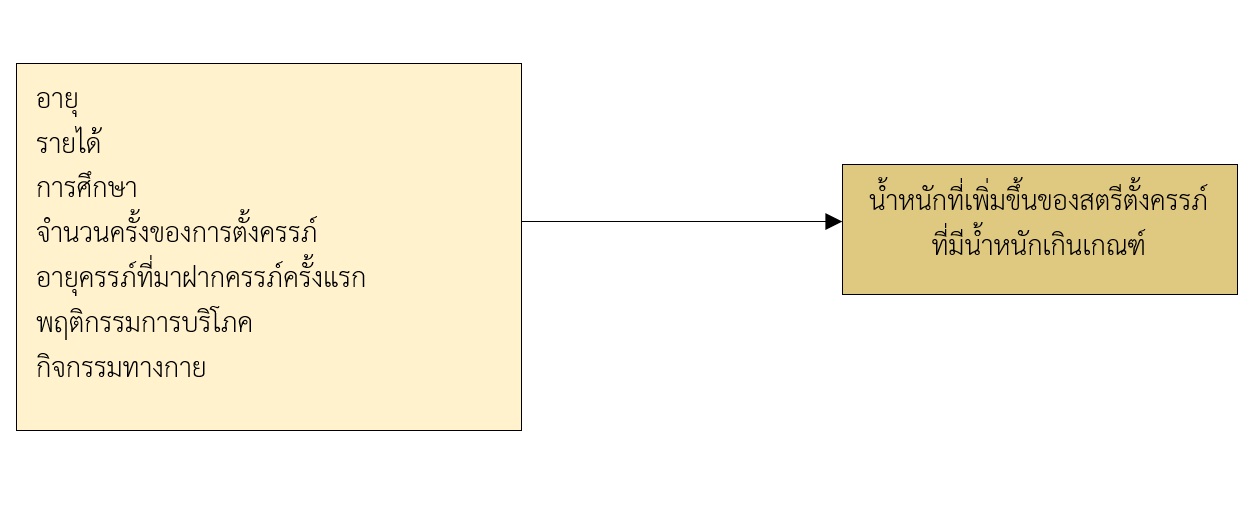ปัจจัยทำนายน้ำหนักที่เพิ่มขึ้นของสตรีตั้งครรภ์ที่มีน้ำหนักเกินเกณฑ์
คำสำคัญ:
น้ำหนักที่เพิ่มขึ้น, ปัจจัยทำนาย, สตรีตั้งครรภ์ที่มีน้ำหนักเกินเกณฑ์บทคัดย่อ
การวิจัยเชิงทำนายนี้ มีวัตถุประสงค์เพื่อศึกษาการเพิ่มของน้ำหนักของสตรีตั้งครรภ์ที่มีน้ำหนักเกินเกณฑ์ และความสามารถในการทำนายน้ำหนักที่เพิ่มขึ้นของสตรีตั้งครรภ์ที่มีน้ำหนักเกินเกณฑ์ จำนวน 174 คน เก็บข้อมูลโดยใช้แบบสอบถามข้อมูลทั่วไป แบบสอบถามพฤติกรรมการบริโภค และแบบสอบถามกิจกรรมทางกายของสตรีตั้งครรภ์ที่มีน้ำหนักเกินเกณฑ์ และทดสอบความเที่ยงโดยใช้สัมประสิทธิ์อัลฟ่าของ ครอนบาค โดยแบบสอบถามพฤติกรรมการบริโภคอาหาร ได้ค่าเท่ากับ .75 แบบสอบถามกิจกรรมทางกาย ได้ค่าเท่ากับ .71 วิเคราะห์ข้อมูล โดยคำนวณร้อยละ ค่าเฉลี่ย ส่วนเบี่ยงเบนมาตรฐาน และสถิติถดถอยพหุคูณแบบทีละขั้นตอน ผลการวิจัยพบว่า
1. สตรีตั้งครรภ์ที่มีน้ำหนักเกินเกณฑ์ มีน้ำหนักเพิ่มขึ้นขณะตั้งครรภ์ต่อสัปดาห์อยู่ระหว่าง 0.14-2.10 กิโลกรัมต่อสัปดาห์ เฉลี่ย 0.52 กิโลกรัมต่อสัปดาห์ (SD=0.33) โดยมีน้ำหนักเพิ่มขึ้นตามเกณฑ์ ร้อยละ 32.8 น้ำหนักเพิ่มขึ้นน้อยกว่าเกณฑ์ ร้อยละ 10.3 และน้ำหนักเพิ่มขึ้นมากกว่าเกณฑ์ ร้อยละ 56.9
2. อายุครรภ์ที่มาฝากครรภ์ครั้งแรก และพฤติกรรมการบริโภคของสตรีตั้งครรภ์ โดยอายุครรภ์ที่มาฝากครรภ์ครั้งแรกเป็นปัจจัยที่ส่งผลต่อน้ำหนักที่เพิ่มขึ้นของสตรีตั้งครรภ์ที่มีน้ำหนักเกินเกณฑ์มากที่สุด (Beta=.477) และรองลงมาคือ ปัจจัยพฤติกรรมการบริโภคของสตรีตั้งครรภ์ที่มีน้ำหนักเกินเกณฑ์ (Beta=-.169) เป็นปัจจัยที่สามารถทำนายน้ำหนักที่เพิ่มขึ้นของสตรีตั้งครรภ์ อย่างมีนัยสำคัญทางสถิติที่ระดับ .01 โดยทั้ง 2 ตัวแปรสามารถอธิบายความแปรปรวนของน้ำหนักที่เพิ่มขึ้นของสตรีตั้งครรภ์ได้ร้อยละ 26.60 (adj.R2=.266, p=.005) และมีความคลาดเคลื่อนมาตรฐานในการทำนาย .2851
ดังนั้นสตรีที่วางแผนการตั้งครรภ์และมีน้ำหนักเกินเกณฑ์ ควรควบคุมน้ำหนักก่อนตั้งครรภ์ให้อยู่ในเกณฑ์ปกติ และเมื่อตั้งครรภ์ควรได้รับคำแนะนำเกี่ยวกับน้ำหนักที่ควรเพิ่มในขณะตั้งครรภ์ และการส่งเสริมพฤติกรรมการบริโภคที่เหมาะสมกับสตรีตั้งครรภ์แต่ละราย
เอกสารอ้างอิง
Abdel-Aziz, S. B., Hegazy, I. S., Mohamed, D. A., Abu El Kasem, M. M. A., & Hagag, S. S. (2018). Effect of Dietary counseling on Preventing Excessive Weight Gain During Pregnancy. Public Health, 154, 172-181. Doi:10.1016/j.puhe.2017.10.014.
Chasan, L., Schmidt, M. D., Roberts, D. E., Hosmer, D., Markenson, G., & Freedson, P. S. (2004). Development and Validation of a Pregnancy Physical Activity Questionnaire. Medicine & Science in Sports & Exercise, 36(10), 1750-1760.
Cherie, M., Linda, K. C. (2018). Gestational Weight Gain: Interventions-Physical Activity and Diet Counseling. Published by Cinahl Information Systems, a Division of EBSCO Information Services. October 5, 2018.
Daemers, D. O. A., Wijnen, H. A. A., Van Limbeek, E. B. M., Bude, L. M., & DeVries, R. G. (2013). Patterns of Gestational Weight Gain in Healthy, Low-Risk Pregnant Women Without Co-Morbidities. Midwifery, 29, 535-541.
Department of Health. (2017). Thailand Recommendation on Physical Activity, Non-Sedentary Lifestyles and Sleeping for Pregnant and Postpartum Women. Nontaburi: NC Concept.
Gettong, N., & Rujiraprasert, N. (2018). Overweight During Pregnancy: An Issue to be Considered for Nurse-Midwifery. Journal of Nursing Science & Health, 41(3), 128-137. (in Thai)
Jantradee, B., Serisathian, Y., & Phahuwatanakorn, W. (2014). Predictive Factors of Gestational Weight Gain. Journal Royal Thai Army Nurses, 15(2), 339-347. (in Thai)
Limruangrong, P. (2015). Nursing Practice for the Management of Overweight in Women. In Sinthu S., Editor. Nursing Practice for the Management of Overweight. 1-19: Wattana Printing. (in Thai)
Lertbannaphong, T. (2017). Maternal Body Weight and Pregnancy: Factors That Obstetricians May Overlook. Siriraj Medical Bulletin, 1(2), 81-90. (in Thai)
Lynes, C., McLain, A. C., Yeung, E. H., Albert, P., Liu, J., & Boghossian, N. S. (2017). Interpregnancy Weight Change and Adverse Maternal Outcomes: a Retrospective Cohort Study. Annals of Epidemiology, 27(10), 632-637. doi:10.1016/j.annepidem.2017.09.008.
McMillan, B., Easton, K., Goyder, E., Delaney, B., Madhuvrata, P., Abdelgalil, R., & Mitchell, C., (2018). Reducing Risk of Type 2 Diabetes After Gestational Diabetes: a Qualitative Study to Explore the Potential of Technology in Primary Care. General Pract, 68(669), 260. Doi10.3399/bigp18x695297.
Rattasumpun, S. (2018). Obesity in Pregnant Women: Health Impacts and Nursing Care. Songklanagarind Journal of Nursing, 38(1), 120-128. (in Thai)
Sangket, N., & Gowachirapant, S. (2018). Energy and Nutrients Intake of Pregnant Thai Women: a Study at Faculty of Medicine, Ramathibodi Hospital. The Journal of Boromrajonani College of Nursing, Nakhonratchasima, 24(2), 18-33. (in Thai)
Shulman, R., & Kottke, M. (2016). Impact of Maternal Knowledge of Recommended Weight Gain in Pregnancy on Gestational Weight Gain. American Journal of Obstetrics and Gynecology, 214(6), 754-754. doi: 10.1016/j.ajog.2016.03.021.
Siriarunrat, S., Tachasuksri, T., & Deoisres, W. (2018). Prevalence and Factors Affected to Excessive Gestational Weight Gain among Pragnancy Women in the Eastern Part of Thailamd. Jounal of Public Health Nursing, 32(3),19-36.
Suliga, E., Rokita, W., & Gluszek, S. (2018). Factors Associated with Gestation Weight Gain : Across-Sectional Survey. BMC Pregnancy Childbirth,18, 465-503.
Swift, J. A., Elliott-Sale, K. J., Pearce, J., Jethwa, P. H., Taylor, M. A., Avery, A., et al. (2017). Antenatal Weight Management: Diet, Physical Activity, and Gestational Weight Gain in Early Pregnancy. Maternal Obesity, Midwifery, 49, 40-46. doi:10.1016/j.midw.2017.01.016.
Thanaratsiriworakul, K., Suriya, N., & Sananpanichkul, P. (2016). Comparison of Gestational Weight Gaint Recommendations Between Study from Thai Population and U.S. Institute of Medicine. Thai Journal of Obstetrics and Gynaecology, 24(3), 161-168. (in Thai)
Thato, R. (2018). NURSING RESEARCH: CONCEPTS TO APPLICATION. Chulalongkorn University Publishing. (in Thai)
Wangchom, S., Xuto, P., & Kantaruksa, K. (2019). Physical Activity, Dietary Quality, Breastfeeding and Weight Retention Among 6 Month Postpartum Mothers. Nursing Journal, 46(4), 94-107.
Ward, M. C., Agarwal, A., Bish, M., James, R., Faulks, F., Pitson, J., & Mnatzaganian, G. (2020). Trends in Obesity and Impact on Obstetric Outcomes in a Regional Hospital in Victoria, Australia. The Australian & New Zealand journal of obstetrics & gynaecology, 60(2), 204-211. doi:10.1111/ajo.13035.
Wutthisarn, K. (2016). Relationships Between Health Belief and Eathing Behaviors In Pregnant Women With Over Pre-Pregnant Body Mass Index. Master Thesis. Burapha University. (in Thai)
Youngwanichsetha, S. (2017). Overweight and Obesity: Impacts on Women Health and Nursing Care. Songklanagarind Medical Journal, 35(1), 75-82. (in Thai)
Zhixian, S., Lisa, J. M., & Jodie, M. D. (2013). Physical Activity Levels During Pregnancy and Gestational Weight Gain among Women Who are Overweight or Obese. Health Promotion Journal of Australia, 24, 206-213.

ดาวน์โหลด
เผยแพร่แล้ว
ฉบับ
ประเภทบทความ
สัญญาอนุญาต
1. บทความหรือข้อคิดเห็นใด ๆ ที่ปรากฏในวารสารเครือข่าย วิทยาลัยพยาบาลและการสาธารณสุขภาคใต้ ที่เป็นวรรณกรรมของผู้เขียน บรรณาธิการหรือเครือข่ายวิทยาลัยพยาบาลและวิทยาลัยการสาธารณสุขภาคใต้ ไม่จำเป็นต้องเห็นด้วย
2. บทความที่ได้รับการตีพิมพ์ถือเป็นลิขสิทธิ์ของ วารสารเครือข่ายวิทยาลัยพยาบาลและการสาธารณสุขภาคใต้







